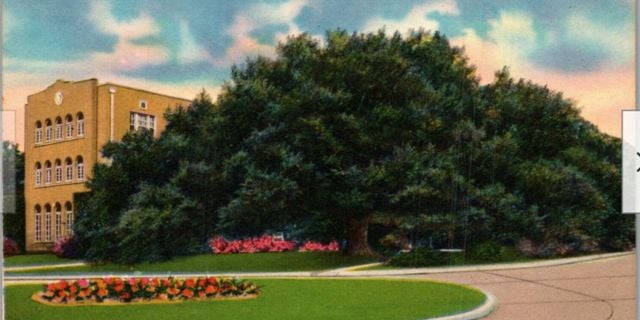Just how much history has Mississippi’s 537-year-old tree seen?
Published 11:49 pm Friday, March 22, 2024

- USM image
“I am called the Friendship Oak. Those who enter my shadow will remain friends through all their lifetime.”
The historical landmark on The University of Southern Mississippi’s (USM) Gulf Park Campus in Long Beach, with the marker bearing this message, sparks curiosity and fond memories for many who encounter the 537-year-old oak near Hardy Hall. The mighty tree has stood as one of nature’s centurions through centuries of Mississippi Gulf Coast history; some who’ve walked beneath its branches claim it possesses the power to plant lifelong friendships.
Historians have surmised the oak was a sapling when Christopher Columbus made his way to the Americas, and that when explorer Ponce de Leon reached Florida in search of the mythical Fountain of Youth, the oak started to bear acorns. As the years passed, it witnessed pirate ships sail into the Mississippi Gulf Coast, some with crews led by Lafitte and Blackbeard.
The Friendship Oak then reached its full state of development during Napoleon’s reign, and after withstanding an untold number of powerful hurricanes while aging gracefully, it is seen today as a symbol of resilience, resistance, and growth.
Dr. David Holt, associate professor of geography at USM Gulf Park, describes the events the oak has witnessed throughout its time on campus, from the joy of weddings to the wrath of Mother Nature.
“The Friendship Oak is a marquis live oak tree on our campus that holds cultural significance to USM and the Gulf Coast,” said Dr. Holt. “We lost part of the tree in 2017 and the break was felt by all of us. Thankfully, the tree survived the damage and remains a great symbol for USM’s grit.”
Dr. Holt has employed the beloved tree as a teaching tool in his classes through the years, with students gaining appreciation for its historical significance.
“We measure the tree every year in my Field Methods class, but we do not core the tree, though every class wants to,” he explained. “We also do repeat photography using historic images of the tree to show how the tree adapts to change.”
On August 1, 1987, a 500th birthday party celebration was held on the Gulf Park campus; according to an article written about the event by Kat Bergeron, a Sun Herald staff writer, the event featured attendees gathering around a tree-shaped birthday cake and reminiscing about the wedding scenes, daydreams, and whispered romances under its glorious canopy.
In 1936, Bob Davis wrote An Autobiography of a Tree where he detailed his trip to the Gulf Park campus, recording his experiences as he sat underneath its magnificent branches. In 1975, the Friendship Oak was nominated to be included in a book on historical trees by the State Historical Museum Department of Archives and History Forestry Commission.
Dr. Jacob Breland, USM Associate Vice President for Academic Affairs at Gulf Park, noted the iconic oak and its uniqueness to the Gulf Coast. For him, it is immensely symbolic of life on the Mississippi Gulf Coast.
“Friendship Oak is a classic example of why we love to live, work, and play on the Mississippi Gulf Coast,” he explained. “It’s a beacon for the communities here on what it means to persevere and persist through the storms of life, but also in the joy found in the friendships we’ve fostered along the way.”





